Baluch Protester Dies As A Result Of Police Beating: Amnesty
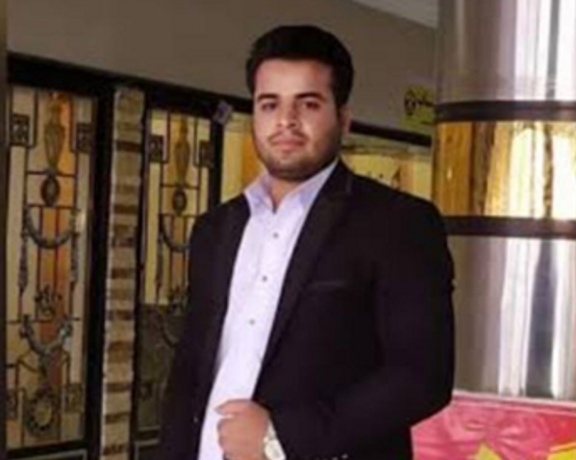
Amnesty International says Ebrahim Rigi, a 24-year Baluch protester in Iran died as a result of beatings and injuries he sustained in police custody this week.

Amnesty International says Ebrahim Rigi, a 24-year Baluch protester in Iran died as a result of beatings and injuries he sustained in police custody this week.
In its statement on Friday, Amnesty also added that “evidence pointing to torture shows once again the Iranian authorities’ horrific assault on the right to life.”
On Thursday, the police commander in Sistan-Baluchistan province reacted to the murder of Ebrahim Rigi claiming that some people having a dispute with the victim had beaten and taken him to the police station while he was unconscious.
Haalvsh website, a local news outlet that monitors rights violations in Iran's Baluchestan region, said in a report that Rigi was arrested on October 13 in connection with popular protests in the southeastern Iranian city of Zahedan.
It quoted local sources as saying that Rigi, a medical intern, had been released on bail but was then rearrested on the street in Zahedan on February 22 and was taken to the police station. He died an hour later.
Reports say the body of Ebrahim Rigi was handed over to his family and relatives on Friday afternoon with bruises and injuries visible and then he was buried in Zahedan.
A large crowd of thousands of protesters gathered in Zahedan on Friday, which has become a weekly practice since September when security forces killed more than 90 people.
Images and videos from Zahedan show the continued presence of security forces in the streets and the deployment of snipers on the hills around the city as well as on some high-rise buildings in the city.
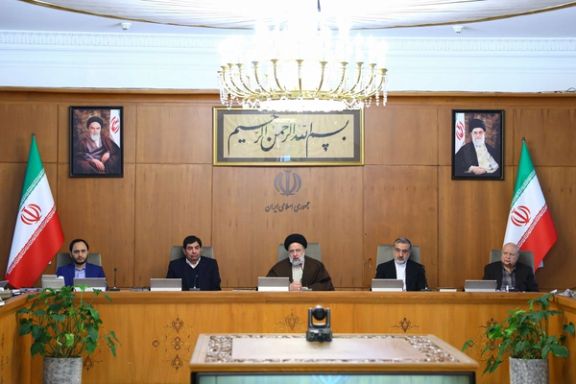
An Iranian reformist cleric says two hardliner factions in Iran control the whole political system and prevent a dialogue to make changes or revise the constitution.
Ahmad Mazani, who was also a lawmaker, likened one group of hardliners to the Islamic State militant group. However, he said that both hardliner factions are reactionaries.
Speaking at the congress of the pro-reform Mardomsalari (Democracy) Party, on Thursday, Mazani said one of the two poles consists of political dwarves. He was presumably referring to the Raisi administration. Also, in an apparent reference to ultraconservatives who challenge the government from within, he called one faction an ISIS-like pole that has deprived Iranians from their right to run "an ordinary life".
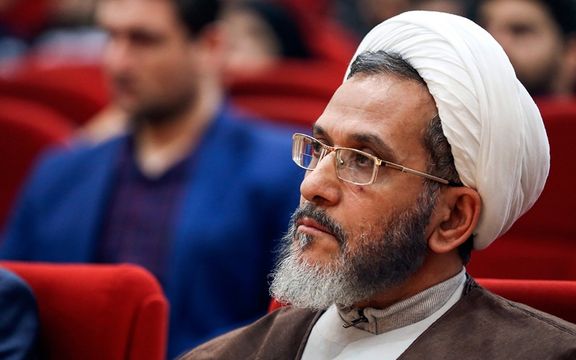
Meanwhile, in an interview with the website of Iranian Sociologists’ Association, prominent academic Mohammad Fazeli said that the current situation in Iran is marked by people’s deep distrust of the government.
Fazeli argued that "in the absence of trust in the government people do not have any long-term plans. In an economy with a double-digit inflation rate and under economic sanctions, political pressures, and the government's intervention in the citizen's private lives, those who have the financial resources will not invest in a factory. They will instead purchase gold and foreign currencies for short-term profit."
Opportunism and short-term planning will become a characteristic of a society in which the people do not trust the government. Such a situation does not leave too many choices for citizens, he said. “
“When the house is on fire, you have only two choices, jumping out of the window or taking the fire exit to make it to safety," he said, adding that "In a society under pressure you cannot expect individuals to consider a series of options. Even if there are really some other options, people tend to choose the ones that help them save themselves as soon as possible."
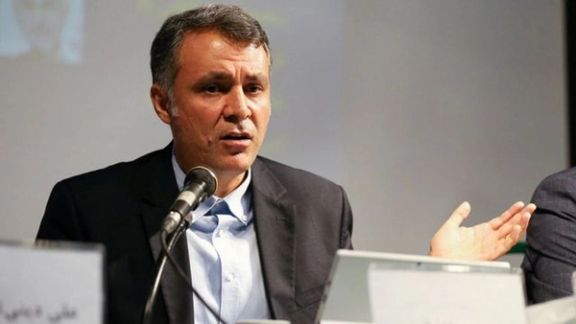
Asked if Iran's future is going to be as horrible as some analysts portray, Fazeli said, "I cannot say for sure, but I can only say it can well end up that way. We have seen other countries in similar situations in the Middle East, the Balkans and Africa. Whether the same thing will happen in Iran depends on other factors," but did not elaborate.
Fazeli said, "The Iranian state television, for instance, has said that as a media outlet that has to convey the government's messages, it has been losing audience during the past years. This is an example of loss of social capital. So, the state television in Iran is no longer a media outlet for the people of Iran. It is a radio and television organization that broadcasts to a small group of people and likes to convince them, not the nation as a whole."
He added, "I believe the only thing on the Iranian state television that is meant for everyone is football. Because it lacks any ideological content and advertisers are happy to pay for commercials." Fazeli added that state TV officials have deliberately decided not to run a television station for all the people.
In the current Iranian crisis, there are also elements who advocate destruction, the sociologist maintained. They believe nothing will be made right before everything goes wrong. In fact, in a situation marked by distrust anything goes.
The academic reiterated that lost social trust cannot be restored easily. "The government needs to take the first step for confidence building by engaging in symbolic acts. It should offer gestures to the society that indicate there is a will in the government to make things right."

The Iranian regime was determined to prevent the Sunni population of Zahedan to hold another round of protests Friday by heavily deploying its security forces.
However, worshippers held their customary Friday protest rally in the provincial capital of Sistan-Baluchestan following prayers, chanting "Death to Khamenei" and "Death to IRGC."
Due to internet shutdown by the government, the sermon by outspoken Sunni leader Mowlavi Abdolhamid was not broadcast live. Internet watchdog NetBlocks confirmed that the real-time network data showed a significant disruption to connectivity in Zahedan. “The incident comes amid a growing security presence during Friday protests," said NetBlocks.
Makki Grand Mosque, where Abdolhamid usually delivers his Friday sermons, was under siege since the early hours of Friday and security forces tried to enter the Sunni mosque but were confronted by angry people. Some social media videos show snipers stationed on the roofs of the buildings and hills in the area.
"We swear on our comrades' blood to stand strong until the end," hundreds of demonstrators were seen chanting in a video from the flashpoint city. Another widely-circulated video showed security forces beating and arresting a Baluch man trying to enter the Makki Mosque.
Similar protests were also reported in other cities of the province such as Khash and Rask.
An audio file of Friday prayer sermons was released to media later in the day, in which Abdolhamid condemned the crackdown that has been going on for over five months across the country, calling for restraint by regime forces.
"Listen to the people and the opposition, and if you cannot solve the problems of the people, leave and let someone who can solve come forward,” he said, implying the need for fundamental change.
"There are problems with domestic policies, and these problems have led to people's protests," Abdolhamid said, adding that the country is in “a serious crisis” and it requires major thinking emerge from it.
Decrying the economic hardships imposed on the people due to rising inflation and devaluation of the national currency, he said that Iran is a rich country and such problems stem from maladjusted domestic and foreign policies. This is the result of having tensions with many countries, he noted.
"Accept that your policies are wrong... we are not your enemies, we feel sorry for the people who do not have the power to buy bread and meat," he added.
He also talked about the massacre of people in the city, known as Bloody Friday, which took place on September 30, when security forces killed more than 80 people, including women and children.
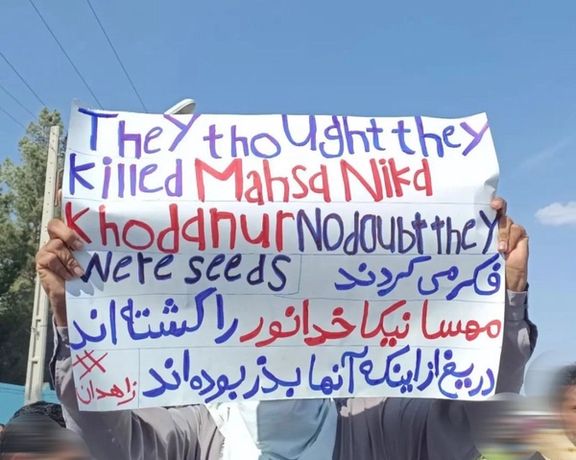
Calling for the truth to be clarified, he said that people were shot at from four directions and nearly 100 people, including 18 children, were killed; 300 were injured, 80 of whom are still hospitalized; 17 people were shot in the eyes.
Mowlavi Abdul-Ghaffar Naqshbandi, the prayer leader of the city of Rask, issued a statement on Friday, threatening the regime of “a historic fatwa.” A fatwa is legal ruling is Islamic which reflects changing economic, social and political circumstances, and is usually abided by the Muslims.
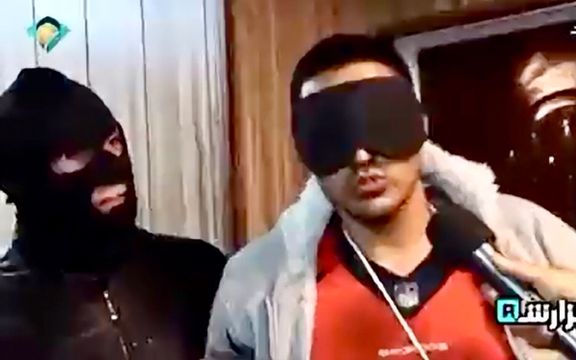
After long airing forced televised ‘confessions’ of dissidents, Iran's regime is increasingly coercing individuals to post dictated statements on social media.
Last week a video of a woman unveiling at an official event in Tehran went viral on social media. On Wednesday, the same woman posted a video of herself apologizing for her “rash” behavior.
Zeynab Kazempour, an engineer, removed her headscarf during the annual assembly of Tehran Construction Engineering Organization (union) after her application to run as a candidate for the board was turned down, presumably on the grounds that she did not abid by the compulsory hijab rules.
In the video, Kazempour is making a short statement on the stage of packed auditorium -- with her headscarf around her neck instead of her head -- about being excluded from the union’s elections. She then throws the headscarf on the floor while storming out as many of her male and female colleagues, both on the stage and among the audience, cheer and applaud her.
“I reacted momentarily, without premeditation … I regret [my reaction] and apologize to the public,” she says in the video.
“Releasing this type of videos has long precedence,” Dadban, a team of volunteers who provide legal advice to activists and protest victims, tweeted Wednesday, adding that security bodies are now forcing dissidents to make coerced statements in front of their own cameras instead of the cameras of the security forces for television.
Iran's state-run television has aired the so-called “confessions” or forced statements of dissidents, activists, individuals accused of terrorism, economic sabotage, blasphemy, and even family members of government violence victims since the very early days of the Islamic revolution to justify prosecution, or execution, of individuals and to discredit opposition groups.
In October, statements very likely to have been acquired under duress from dissident rapper Toomaj Salehi were aired by the state television.
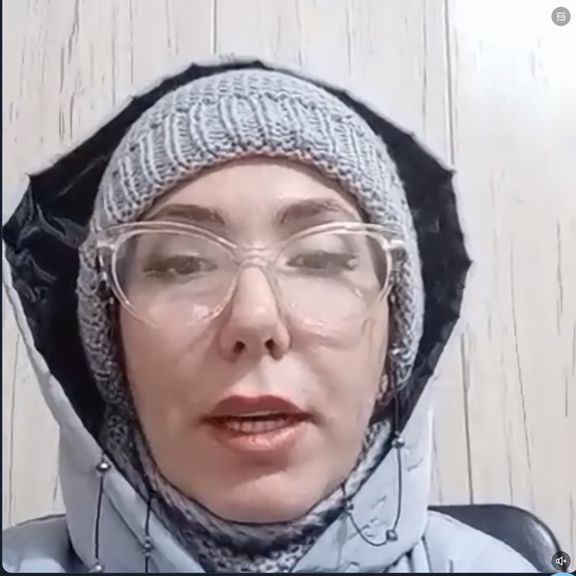
Many Iranians also believe that since his arrest in September, and being released on bail in October, another popular artist Shervin Hajipour whose song “Baraye Azadi” (For Freedom) has become an anthem for Iranian protesters has been under pressure to post “dictated” content on Instagram.
Shervin whose song won this year’s Grammy Awards’ “Best Song for Social Change”, a new category, said in a post on Instagram after his release from prison that he was sorry that his song was being used by dissident political groups outside Iran. After winning the award he also said in a post he regretted that his award was presented, in absentia, by the US First Lady Jill Biden.
The once quite effective televised “confessions” have largely lost their clout in the Iranian society where many repudiate them as mere propaganda. As a counter-measure, many now even refuse to share or like social media posts that they think have been dictated to the author by security forces or extracted under duress in prison and even block those who circulate such videos on their accounts.
“Such [coerced] confessions may have worked in the early days of the revolution but fortunately they have lost their [desired] impact now due to being repeatedly used for all sorts of things. These have even made the incompetent security organs the butt of jokes,” Maziar (Mazyar) Ebrahimi, a businessman who was tortured to ‘confess’ that he had been spying for Israel and was involved in the assassination of Iranian nuclear scientists in 2012 tweeted about the airing of anti-compulsory hijab activist Sepideh Rashno’s forced statements in August.
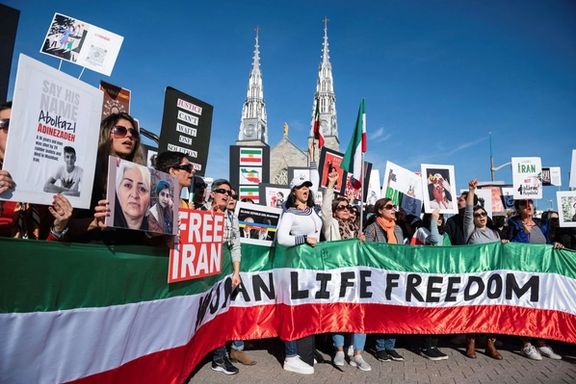
The Canadian government has announced it will facilitate the process for Iranian temporary residents in Canada looking to extend their stay.
In a statement on Thursday, the Canadian government cited the Islamic Republic's crackdown on the current wave of protests as the reason behind the new measures. “Canada is committed to protecting Iranians already in Canada, and to helping Iranian families stay together. In light of the gross and systematic human rights violations being committed by the Iranian regime during its brutal crackdown on protesters, some may wish to prolong their stay in Canada rather than return home at this time,” read the statement.
"Effective March 1, 2023, these measures will make it easier for Iranians who wish to extend their temporary status in Canada and to move between temporary streams, allowing Iranians to continue studying, working or visiting family by applying for a new permit from inside Canada," it added.
The Canadian government said an open work permit pathway will be made available for Iranians already in Canada, adding that applications from Iranians in Canada will also be processed on a priority basis.
Canada also said it was waiving certain processing fees for Iranians who wish to extend their stay in Canada, and will also waive passport and permanent resident travel document fees for citizens and permanent residents of Canada in Iran who wish to leave.
"Canada will not stand idly by in the face of these aggressions as the Iranian regime continues its ongoing human rights violations," Canadian Immigration Minister Sean Fraser said.
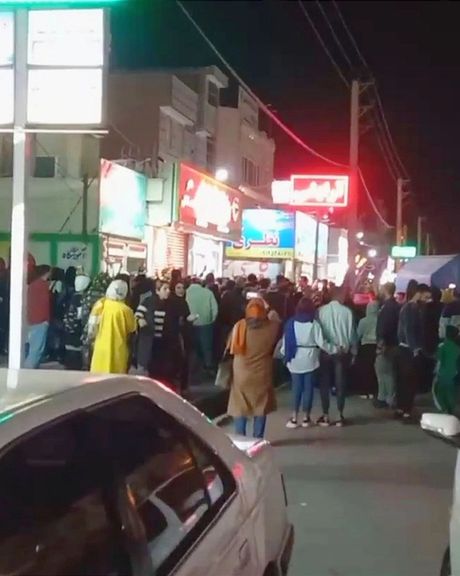
A group of Basij militia forces have attacked a girls' language school in Eslamshahr in the vicinity of Tehran arresting several girls on the pretext of not wearing hijab.
A video sent to Iran International shows Basij plainclothes agents raid Zabangostar school Wednesday night detaining two teenage girls after sealing off the school.
According to witnesses, Basiji forces were filming the classes during the attack.
Reports say citizens, parents and female language learners resisted the attack chanting slogans such as "Death to Basiji".
Violence against women, especially teenage girls, due to what the regime calls "improper hijab" has been going on for over four decades. During the uprising of the Iranian people the violence has intensified with the increase of women's civil disobedience against the mandatory hijab.
The Islamic Republic, however, confronts such civil disobedience with heavy punishment for what it calls "removing hijab".
Despite regime’s efforts to suppress such moves, several famous figures including actresses and female athletes joined the movement against the mandatory hijab and removed their headscarves.
In a statement in January, fifteen prominent Iranian figures, who are usually referred to as “religious intellectuals”, condemned the government policy of compulsory hijab and suppression of women.
Results of surveys conducted by Iranian government agencies are usually not made public, but according to a survey carried out by the ministry of Islamic guidance in 2015, more than 70 percent of Iranians do not agree with compulsory hijab.